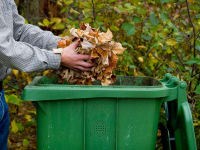5 driveway repairs to make before winter hits
Snow and ice will be no match for your turf
Products are chosen independently by our editors. Purchases made through our links may earn us a commission.
With winter ready to arrive, you may have already started your prep for a cold and snowy season, stocking up on some extra space heaters and investing in a new winter coat.
And while that first snow brings a sense of excitement for the new season, the realities of winter trail quickly behind: snow-covered cars, slick sidewalks, and other headaches are waiting on the other side.
Before the white stuff starts falling, there are precautions you can take to prep your home’s exterior and landscape to soften the less-than-desirable conditions that snow and ice can create.
From major driveway cracks to uneven sidewalks and walkways, damage caused by snow and ice can lead to expensive repairs. But, with some extra care and maintenance, you can prevent it.
1. Give your driveways and walkways a deep clean
Before winter strikes, make sure you give your driveways and walkways a good cleaning. Any residual dirt, debris, chemicals, or any other messy matter becomes more difficult to clean up during or after harsh winter weather.
When water freezes over, leftover oils and chemicals can also contribute to the damage done to the pavement.
Use a pressure washer to completely remove debris from your paved surfaces—you can rent a professional grade power washer from The Home Depot, or buy one if you think you’ll have a lot of use for it. Have a driveway cleaner and degreaser on hand to get tough oil or grease out of the pavement.
2. Smooth on a driveway sealcoating
If you live in a snowy climate, you know how quickly snow can come and go. But once that snows or ice melts and leftover water refreezes, it quickly expands, posing a danger to your driveways and paved surfaces. That’s because many have natural cracks and openings that water can easily settle into.
“Water that gets into these fissures will freeze and expand, causing further issues you likely won't be able to fix promptly during the wintertime,” says David Cusick, chief strategy officer of House Method, a home and landscape resource.
To prevent any cracks or corrosion from occurring in your concrete, brick-paved, and asphalt pavements you should use a driveway sealer like a concrete crack sealer, which typically works for concrete, brick, and paved driveways. However, it’s even better if you can find a sealer that is guaranteed to work appropriately on your specific driveway type.
Before using a driveway sealer, make sure you wash off any dirt or debris from the driveway’s surface and remove any intrusive grass or weeds. Use a long squeegee to evenly spread the sealer, carefully ensuring any and all driveway cracks are filled.
3. Protect it from potential rock salt damage
Once inclement weather hits, you may be tempted to dust your entire driveway and walkway with rock salt ice melter, which helps keep surfaces from becoming dangerously slippery.
However, using rock salt may unintentionally cause more damage to your paved surfaces. “While it's an effective way to melt snow, rock salt also damages white-grey concrete,” says Cusick. This is because chemicals found in most rock salts can result in the rapid corrosion and discoloration of your driveway or walkways.
If you absolutely want to salt your driveway, before the winter season starts, make sure your driveway is sealed with a product that also protects from rock salt damage. This Prosoco Saltguard sealer recommended by Cusick decreases the chance of discoloration and scratches caused by rock salt.
You can also use rock salt alternatives like this pet-safe ice melter that claims to be much gentler on concrete driveways.
4. Address large cracks and potholes now
If you already have damage to your driveway, sidewalk, or walkways, you should take care of these problems before harsh weather arrives.
Use a crack repair sealant with a small tip to carefully fill up any cracks in your concrete driveway or walkway.
For asphalt driveway repair, use a specific asphalt crack sealant to match the color and texture of the existing driveway.
For larger cracks, like potholes, a pothole repair sealer, like this one meant for asphalt or concrete works well.
5. Stock up on new stone for your gravel driveway and walkways
While concrete and asphalt surfaces require a certain care process, a gravel driveway requires a whole different regimen. It’s good practice to replenish it with new gravel before the winter comes.
Gravel driveways can easily collect mud puddles, which makes for a messy cleanup. Since you can’t use a sealant on gravel, to prevent this, you can add a geotextile fabric underneath to soak up excess water when snow and ice melts.
If you want to keep your gravel driveway from becoming extremely slick, an ice melter is completely fine to use, as it won’t create any noticeable damage to pebbles and stones.


